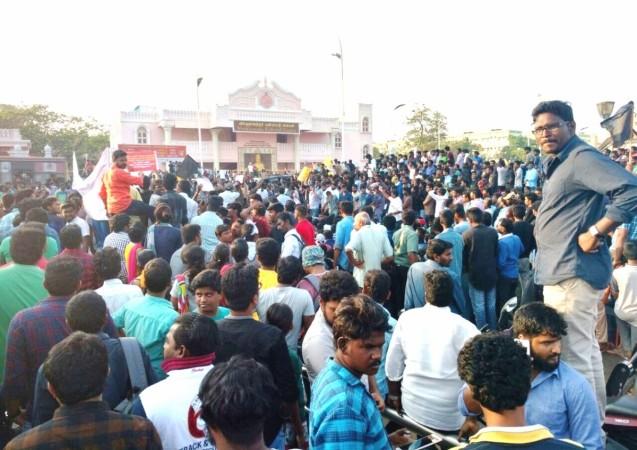
A group of like-minded youngsters, backed by thousands of residents of Tamil Nadu, are demanding that the India chapter of People for the Ethical Treatment of Animals (PETA) be banned from the country. Their demands rests on the argument that it was on the basis of the "old evidence" submitted by PETA that the Supreme Court banned the bull-taming sport of Jallikattu in the state.
Their protests seemed to be gaining momentum as the day progressed, with Sasikala Natarajan, the leader of the AIADMK, which currently rules Tamil Nadu, saying: "The Central government should promulgate an ordinance revoking the ban on Jallikattu. We will adopt all legal measures to ban PETA."
Also read: Jallikattu controversy: Celebs join people's protest to ask Centre to lift ban
Dharanidharan, an entrepreneur who is a part of this group of youngsters leading the protests, one of which recently took place on Marina Beach in Chennai, told International Business Times, India, that the evidence PETA had presented to the Supreme Court was old and also wrongly projected that the bulls were caused harm.
"This [Jallikattu] is an age-old tradition, where the main agenda is to test the breed [virility] of the bulls. There used to be instances earlier of the bulls' tails being bitten to make them more aggressive, but the person who tamed the bull by hugging its hump and hanging on would be the hero of the entire village," he said.
"Now, if there is a problem with the rules, please change them, but do not ban the sport altogether. Tamil Nadu is emotionally connected to it. All throughout the year the bull is treated like a member of the family," he added. "And yet, in Spain, where the bulls are killed after they run, they [PETA] have not done anything."
PETA dismisses allegations
PETA India spokesperson Nikunj Sharma dismissed all the allegations of providing "old evidence." He told IBTimes India: "For starters, the evidence was not submitted by PETA but the Animal Welfare Board of India, which is a government organisation. Also, the evidence was from 2011, 2012, 2013 and 2014. It was after reviewing this evidence that the Supreme Court banned Jallikattu in mid-2014 and called the sport 'inherently cruel' towards the bulls."
He added: "Bulls are anatomically not designed to run. The people make them run by poking them, making them drink alcohol, biting their tails and by other means that scare them. Bulls are prey animals, who run only when scared."
Sharma also said that allegations that PETA was trying to weaken the native breed of cattle so that it could introduce cross-bred cattle were absolutely baseless. "We at PETA are entirely vegan: We do not even drink milk. What motivations would we have for getting cross-breeds — which give more milk and are stronger — introduced in India?" he asked, adding that the native breed of cattle is being wiped out for a long time now. "A study conducted from 1997 to 2003 had shown that they were being affected because of changing farm practices," Sharma said.










!['Lip lock, pressure, pyaar': Vidya Balan- Pratik Gandhi shine in non-judgmental infidelity romcom Do Aur Do Pyaar [ Review]](https://data1.ibtimes.co.in/en/full/797104/lip-lock-pressure-pyaar-vidya-balan-pratik-gandhi-shine-non-judgmental-infidelity-romcom.jpg?w=220&h=138)






